#industrial electric spares
Explore tagged Tumblr posts
Link
mjvaluemart offers a wide range of switchgears & circuit protection for industrial use at negotiable prices.
#switchgears#circuit protection devices#industrial electric spares#industrial switchgears#industrial circuit protection
0 notes
Text
Industrial Spare Parts Suppliers In Germany
VBN Vertriebs GmbH is one of the leading industrial spare parts suppliers in Germany, offering an extensive range of components to meet the needs of various industries. Our parts are sourced from reputable manufacturers, ensuring you receive high-quality and durable products. With quick delivery and exceptional customer service, we help keep your operations running smoothly. Visit our website today to explore our inventory and place your order.
#industrial spare parts suppliers#spare parts supplying company#Electric motors Offenburg#VBN Conveyor equipment#SEW Geared motor Offenburg#automation solutions Offenburg#tailor-made sensors solutions Offenburg
0 notes
Text
Robocraft Store
Robocraft is a leading supplier of lithium ion battery (LION Cell Energy) from ahmedabad, india. We offer other electronics accessories like batteries & chargers, electric vehicle spare parts, e-bike motors and controllers, wireless solutions, robot parts, sensors, industrial power supply , ev kits, sensors, stepper motors and controllers, automation control and cnc machine parts.
Our industry provide different batteries like LiFePO4 Battery, Prismatic Battery, Lead Acid Battery and Lithium Polymer Battery.
You can check our website robocraftstore.com or contact us on 9429230946.
#lithium ion battery#mppt charge controller#electric vehicle spare parts#e bike batteries#ebike motor#electric bike charger#lithium battery chargers#volt ebike battery#battery bike charger#controller e rickshaw#wireless solutions#industrial power supply#automation control and cnc machine parts#e-bike motors and controllers
0 notes
Text

The Toei Electric Driver VLAST-012P2V-XX is a high-performance device designed for precision control in industrial automation. This driver features advanced technology for reliable and efficient operation, making it ideal for various applications. With its robust build and user-friendly interface, the VLAST-012P2V-XX ensures smooth performance and enhanced control over your machinery. It supports a range of configurations to meet different operational needs, improving overall efficiency and productivity. Perfect for modern industrial environments, this driver combines durability with advanced features to optimize automation processes and drive success in your operations.
#auto2mation#industrial equipment#industrial automation#industrial and marine automation#industrial spare parts#industrial and marine automation equipment#industrial automation equipment#drives#toei electric
0 notes
Text
https://auto2mation.com/industrial-automation/control-unit.html
#Allen Bradley#ABB#Buy Marine Equipment Online#Buy Marine Automation Product online. Ship Automation#Marine & Industrial Electricals#and Electronics#Largest stockiest of Ship Spares.
1 note
·
View note
Text
I am not the kind of person who would become a chicken farmer. Don't get me wrong: I can certainly understand the reasons why you would. There's a lot of different makes and models of chickens, and they help keep bugs out of your property. Plus, they make eggs. There is, however, one big downside: you don't have to buy a special vehicle for them.
One of the greatest things about agriculture is that it gives you an excuse to buy a specialized automobile or automobile accessory. Cows? Need a cattle trailer. Horses? Horse trailer. Big trucks in either regard. Chickens are small, so you can throw them in the back of your regular ol' Subaru wagon, and take them to the chicken vet whenever you want. It's an easy lifestyle, but as Socrates once said, the life where you don't buy a cool niche automobile is hardly a life at all.
Don't worry, shareholders. I am fully aware of the spending power and spare capital of chicken-lovers all over the country. There is a non-solution from Switch Industries to this non-problem. We simply give the chickens each their own little cars. They can drive themselves to the vet, or to the feed store, and sleep in their cars rather than rely on the construction of old-fashioned, expensive (and increasingly costly) chicken coops.
Many haters are speaking out against this project, and I address those haters now. You might think that this is excessive. You might think that this is impossible. You might think that this is illegal. Self-driving car technology has come a long way from the early days of "tie a rope to it." With modern Japanese technology (i.e. batteries stolen from floor models of Makita power drills at Home Depot,) a small chicken-operated electric car, built out of a repurposed Power Wheels®, can easily reach highway speeds.
As for illegality, it turns out that the current government will write whatever law we tell them to do, as long as we grow our chicken-driving industry to a size that is awkward to legislate before those lawmakers wake up to the threat. It is for this reason that I've partnered with some only-slightly-arrested junk bond kings in the tri-state areas to fuel this development.
So if you have a bunch of chickens on your property, easy access to the highway, and a lack of legal representation, call Switch Industries as soon as possible. We'll get you hooked up with your own fleet of NuggetRides® as soon as possible. You won't regret it, or at least we won't.
287 notes
·
View notes
Text
Hi friends, wondering if anyone with any disposable income or any energy to drop a few kind words or reblog amidst the other things going on in this world could please help me.
My sister is autistic, and has a very low frustration threshold. I've seen her literally in tears so many nights because she was not able to finish her work in time. We cannot afford to take her to specialized schools. She is currently a teenager, and she failed two of her subjects because she was not able to finish some of her work on time. Currently I am not able to enroll her to her school because I was not able to pay in time some of her remaining tuition fees and her back subjects that she had to retake.
Both my parents are disabled, and need a constant stream of medication- my mom's insulin, and anti seizure medication alone is almost at 400 usd alone, and I'm alone working.. for electricity and gas and water.. (we live in the philippines).. and I only have 20,000 pesos (363 usd) saved and am able to spare.. including emergency money, fun money, etc; am dropping it all into my sisters school bills. I'm short another 363 usd to pay for my sister's tuition fees, and the internet might get cut off later. We were given until December to pay so she csn enroll on time but she did not tell me until yesterday. I'm not sure what to do. I currently work three jobs, but my main one for industry work is very unstable. I'm not able to post any of this on twitter becaude of morality clauses and etc.. I already got unceremoniously dropped from a lineup of artists on a board game bc of my posts about the ongoing genocide. If anyone could please read this post for more info
https://www.tumblr.com/littlestpersimmon/735454820613423104/just-wanted-to-say-thank-you-everyone-who-donated
It would mean everything to me. It has to my links to my patreon and my print shop and tipping jars. I'm sorry things are so hard for everuone rn. Thank you for reading, it means the world to me. I will also try to open square commissions later so help cover the tuition fees sooner and so that folk can get something in return, just that I can't find my charger rn bc I'm so frazzled and panicked. Thanknyou so much again!!!!
672 notes
·
View notes
Text
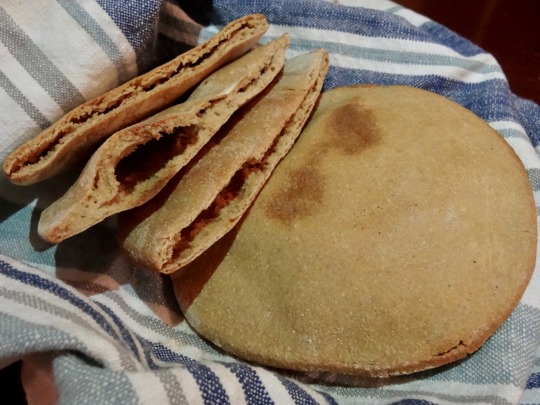
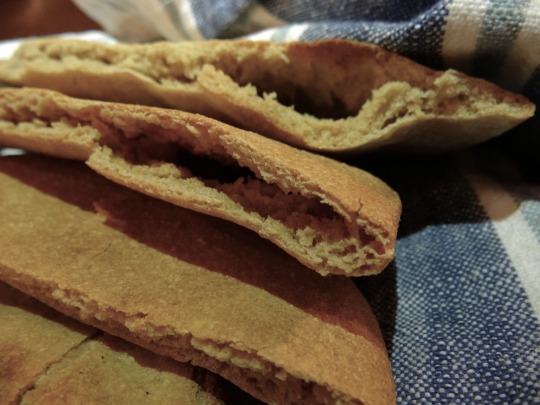
[ID: One puffy circle of bread, and three which have been halved to show an internal pocket, on a striped blue and white kitchen towel. End ID]
خبز الكماج / Khubiz al-kmaj (Palestinian flatbread)
Khubiz al-kmaj is a thin flatbread with an internal pocket. It is commonly eaten with breakfast to scoop up dips such as hummus, used to eat stews, served alongside main dishes, and used to make sandwiches and to wrap falafel. "خُبْز," pronounced "khubz" or (in Levantine varieties of Arabic) "khubiz," comes from the root خ ب ز (kh-b-z), which also produces the word "خَبَزَ" "khabaza" (Levantine: "خَبَز" "khabaz"), "to bake."
This bread is eaten across the Levant and in Greece, with slight differences in terminology and style. It is variously called "خُبْز العَرَبِيّ" (khubz al-'arabiyy; Arabian bread), "خُبْز "البَلَدِيّ (khubz al-baladiyy; bread from my country), or (occasionally) "خُبْز البيتة" or "البيتا" (khubz al-bita), a borrowing from "pita." ("Pita" itself is perhaps from Greek "πίτα" "pita," or the modern Hebrew "פיתה.") The bread is referred to as "khubiz al-kmaj" in Palestine, from the Turkic "kömeç" / كُمَجْ ("bread baked in ashes"). The collective term for the bread in general is كماج (kmāj); each individual piece of bread is referred to with the singulative "كماجة" (kmāja).
Today, kmaj is frequently made with white flour; some people add olive oil or milk powder to ensure a very soft dough. Leila el-Haddad writes that a more traditional method omits milk and uses whole white spring wheat, a whiteish wheat grain harvested in late spring and ground without removing the bran.
Since the late 20th century, many Palestinian households have used an electric cooker (طنجرة الكهرباء; ṭanjara al-kahrabā') to cook kmaj, placing one kmaja inside of the chamber and one on top and allowing both to bake at the same time. These aluminum and tin cookers, which were invented in Gaza and became popular there during the first intifada in the late 1980s, are designed to route electricity through a metal pipe or spiral wire on the underside of their lids, heating both the top and the inside of the cooker simultaneously.
The cookers' popularity can be attributed in part to a curfew that Israel imposed on Gazan refugee camps during the intifada, supposedly in an attempt to restrict the movements of resistance fighters. Refugees in the Jabalia camp in the north, for example, unable to afford home stoves, and without the necessary outdoor space to make familial clay ovens, would have to wait in line for hours every day to get bread from shared ovens, risking curfew violations; household electric cookers were far more convenient. The success of local industry and innovation in the form of Gazan-manufactured technology was also symbolically and strategically important during the first intifada, in which Palestinians employed strikes and boycotts (largely organized by women) of Israeli companies and goods as a strategy of resistance to occupation.
An electric cooker is still today considered a very important tool, as it spares families the need to purchase kmaj (the price of which was soaring compared to the cost of flour in the 2010s, and which was often of inferior quality compared to what could be made at home). They are frequently given as wedding or housewarming presents. Lack of access to electricity, though, imposes a limiting condition on the usage of these cookers, as Israel has for over a decade strangled the flow of power to Gaza: Abier Almasri wrote in 2017 that tasks such as cooking and laundry had to be rushed during the four or so hours a day when electricity was available. In this environment, electric cookers are useful in that they can prepare a lot of bread in a short period of time. Fathia Radwan said in 2022 that she would wake up early, after the nightly power outage, to prepare more than 100 loaves of bread at a time for her family of nine.
Today, the taxes that Israel levies on imports of raw materials into Gaza makes the cost of new electric cookers, which sometimes exceeds 120 shekels (37 USD), too expensive for some families to afford. The difficulty and expense of importing materials, and the impossibility of exporting goods to foreign markets with the advent of the 2007 siege, also limit the number of factories in Gaza that are able to manufacture these cooking pots. The aluminum industry, introduced to Gaza in the 1960s and once the basis of a manufacturing and economic renaissance in the region, deteriorated as a result of the siege, as factories were no longer able to export goods to the West Bank and were newly reliant on imports of raw materials from Egypt. Even parts to repair electric cookers are expensive, due to a tax levied on items judged by Israel to have a "dual," i.e. a possible civilian and military, use.
Still, repairman Iyad Faraj estimates that over half the homes in Gaza have and use an electric cooker, as maintaining, repairing, and operating one is cheaper than having a gas pipe installed (at 68 shekels, 20 USD) and purchasing gas. Electric pots thus stand in many homes as both a utilitarian item, and a symbol of Palestinian ingenuity and resistance to Israel's attempts at impoverishment and starvation.
Support Palestinian resistance by contributing to Palestine Action’s bail fund or to Palestine Legal’s defence fund, by attending court or making a sign to support the Elbit Eight, or by buying an e-sim for distribution in Gaza.
Ingredients:
500g (4 cups + 3 Tbsp) white whole wheat (spring) flour
1/2 Tbsp (5g) active dry yeast
1/2 Tbsp (6.25g) vegetarian granulated sugar
1/2 Tbsp (7.25g) kosher salt
About 2 1/4 cups (530mL) room-temperature water, divided
Olive oil
White whole wheat flour is flour that has a white color once ground, despite the fact that it includes both the bran and the germ of the wheatberry. It is milled from white spring wheat (so named because it is harvested in late spring).
You may instead mix white all-purpose flour and brown whole wheat flour in your desired proportion. Keep in mind that whole wheat flour will need more water and more kneading than white flour. If you’re using all white flour, you will need about 1 1/4 cup (300mL) water.
Instructions:
1. Mix flour, yeast, sugar, and salt in a large mixing bowl. Add water gradually until dry ingredients come together into a sticky dough.
2. Knead the dough on the countertop or in a wide, shallow bowl until smooth, about 5 minutes. (If using whole wheat or white whole wheat flour) continue incorporating water into the dough as you knead to maintain a tacky texture.
3. Fold the dough into a ball and return to the bowl, seam-side down. Pat the top of the dough with some olive oil, cover the bowl, and let rise for an hour.
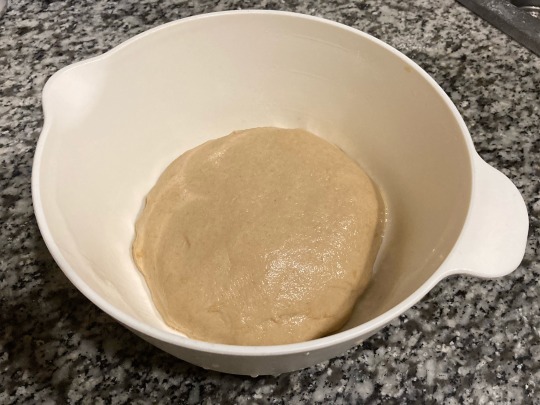
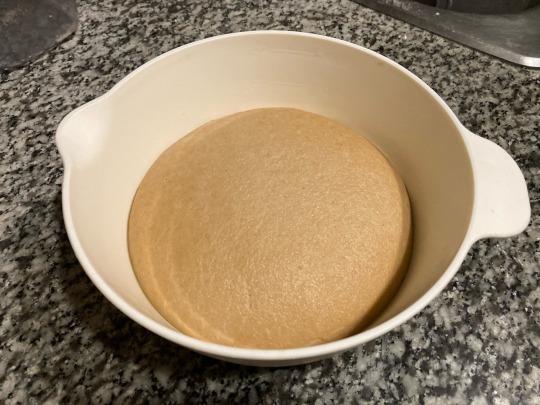
4. Pinch the dough into about 8 balls of equal size (about 110g each). Cover and let rest for 10 minutes.
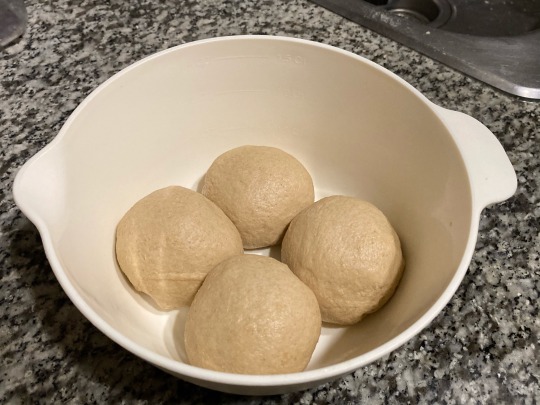
5. On a lightly floured surface, roll out each ball of dough into a circle about 1/4" (1/2cm) in thickness. Set dough circles on a surface prepared with parchment paper and cover closely with a kitchen towel or plastic wrap. Let rest and ferment for at least 1 and up to 10 hours.
An overnight rest is traditional in Palestine and will create a more complex flavor in the bread (see note below).
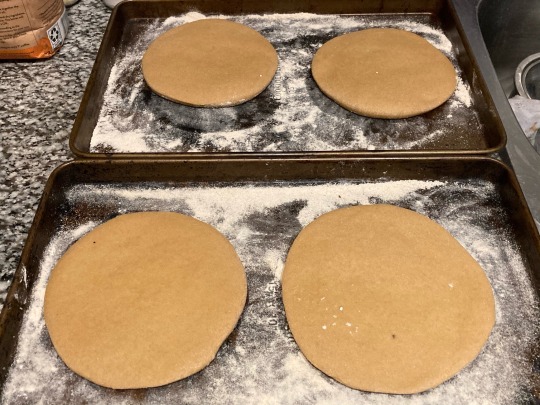
6. Remove each circle of dough from its resting place with a metal spatula and roll it out to a 1/4” thickness again. Preheat a baking stone or sheet in the top third of an oven at 500 °F (260 °C), and then cook breads in the oven for three minutes, until large bubbles have begun to form.
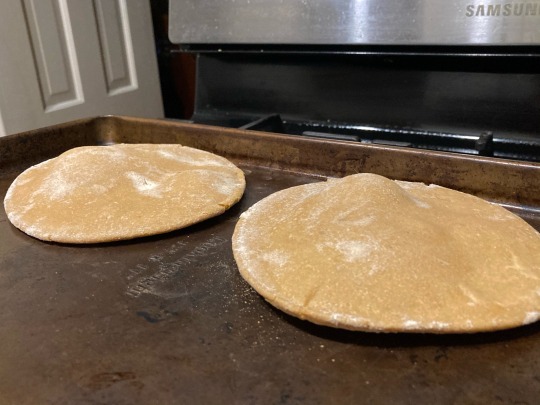
7. Flip bread over and cook for another 3 minutes on the other side, until golden brown and puffed up completely.
8. Wrap breads in a kitchen towel or tea towel and allow to steam for a few minutes while the others cook.
Notes
The climate where I live is dry enough that I have discovered a risk of my breads becoming crackers if I leave them out overnight. The dried-out flatbread does puff up in the oven, but the resulting product is not as nice and fluffy as it should be.
Through experimentation, I have found the best method of both preventing drying out and guaranteeing that the flatbreads will puff up during cooking the next day is:
1. Roll out the dough and place dough circles on a lightly oiled surface. Cover them closely with lightly oiled plastic wrap.
2. The next day, fold dough circles back into balls. Place seam-side down and roll out again on a lightly floured surface.
3. Bake as described above.
If you live in a humid environment, the first instructions given in the recipe above should work for you.
423 notes
·
View notes
Text
day 10: making love | @wolfstarkinktober2024 | 3993 words
MINORS DNI - NSFW - EXPLICIT
(also: crying, spit as lube, touch-starved Sirius)
Also on AO3 here
****
The signal takes twelve years to reach Earth.
There are many colonies now. Some stay in close touch, sharing news, sharing commercial routes. They’re an extension of the life already thriving on the home planet; separated by distance but keeping trade and communication alive.
Not Proxima Centauri b.
Remus remembers reading about it when the colony was established. When Black Industries had revealed themselves to be little more than a cult and left Earth behind to start a new, pure human race.
There was nothing from them. Until now.
The colony has collapsed. Send help, the voice said, then twenty two seconds of static silence. Then: please.
Chances are there is nobody there anymore. That’s what Head Command cited, when they ruled out the possibility of sending search and rescue. The message was sent twelve years ago, the admiral said, whoever sent it, they’re dead by now.
But those twenty two seconds played on repeat in Remus’ head. He woke up hearing them, fell asleep replaying them. Then, one morning, the final word, the please, appeared in his dream, and he knew he had to do something.
He’s had some favours he’d scrounged up over the years. Things he never thought to cash in, because what for? He didn’t mind covering the odd shift or hiding the odd miscalculation that a higher-up missed. Sure, there was the time when Admiral Dumbledore came to him to fly someone out of the Sol system under the radar. Sure, Moody once did ask him for help derailing legislation through less than stellar means.
As it turned out, he’s had quite a few people he could press on, lean on, to make it happen. Nobody understood why he cared so much. He didn’t understand either.
But he was given a ship, and indefinite time off work (a sabbatical, they called it - like pilots ever had those). He went alone because that was the deal. Nobody is to know. This is a waste of resources and of taxpayer money.
Two weeks, it takes him to reach the exoplanet.
(Nothing, in comparison to twelve years.)
He doesn’t mind the solitude. Just him and his little ship, and all the stars in the sky. It’s a newer model, easier for a crew of one to manage than the older ones. The computer working the systems keeps getting smarter. Soon, Remus thinks, his job will be obsolete.
Proxima Centauri b is pretty from orbit. Vast oceans, swaths of green, sun-bathed clouds hiding it from view in the most picturesque way. Remus watches as the line of day-night moves across the surface of the planet, so, so slowly. He’s stalling - he’s here and now he’s stalling, because this is it. What if it was for nothing? What if the voice had been extinguished in all the years that passed?
He’s not to land unless he makes contact: a waste of fuel on an already wasteful journey. It’s a clear command and already he knows he’s going to break it, because he’s not come this far just to be waylaid by the colony’s malfunctioning communicator, or the owner of the voice not seeing his message. Because, if he’s there, why would he check it? After all those years?
Still: there is flagrant disregard of orders, and there is covering one’s tracks, so Remus sends out the message.
Survivors of the Proxima Centauri b colony, come in.
The little black text on the little green screen flickers with its own electrical life.
No response comes and Remus tells himself you knew this would happen, it doesn’t mean anything. He sends the message again, and then again after a couple of hours. He has enough fuel to stay in orbit for a week and still get back to Earth with a safe amount spare.
He’s planned it like this: three messages, equal times apart, to show he tried it that way first. Then, short circuit the communicator - notoriously unreliable on the class of ship he’d been provided. Nobody can blame him for not trying. Nobody can blame him for finishing the mission in person.
What else was he to do, turn back?
He lands as near to the colony as the landscape allows. The compound is vast but the atmosphere is breathable. Remus has gotten used to the staleness of the recycled air he’s been in for a fortnight and this freshness is so welcome it makes him a little bit dizzy.
From the first look, it’s clear that the colony was abandoned - that something had happened. Remus’ footsteps echo against the white walls of the compound in an eerie quiet. He’s been to these places, these colonies, more times than he can count, but never once had he seen it empty.
It’s only the steady humming of power, running through the cables built into the floor, that gives him hope.
He comes across a doorway to an Aeroponics bay and this - this can’t be something that had cultivated itself. There must be someone here.
The plants have grown tall, their exposed roots well maintained - the air is moist, warm and hazy and Remus doesn’t think he sees an automatic water deployment system. Somebody must have just sprayed them. He touches the leaves of potato plants, gathering the moisture with his fingers because it’s a dual thing of life here - a sign and a gift.
There’s corn, and what he thinks is spinach, and strawberries. He shouldn’t be surprised - this was a large scale colony, with families and children. Of course they’d have things just for pleasure, even if it’s not the best use of the space.
The first time Remus sees him, it’s just a glimpse of a person walking through greenery. An afterimage of dark hair, of leisurely steps, of a strong, straight posture.
And then the man takes a few steps into the main aisle and turns around, and there he is.
It’s clear he’s been living by himself for too long. His hair hangs past his shoulders, unkempt but clean, a mess of black waves. There is a thinness to his frame, a suggestion of jutting elbows and sharp hipbones, clothes hanging on him like they were used to a larger body. Facial hair accentuating the edges of his cheeks, the set of his eyes.
Even like this, clearly malnourished, clearly not caring for his appearance, he’s beautiful.
They stand apart - two meters, maybe three. Remus still in his flight suit, the man in something soft and worn and comfortable. There’s the buzzing of electricity and the humming of the air purification unit and no other sounds, none at all.
Remus knows it’s him. He knows his silence as others would know his voice
And then: “You came,” and the voice, too, is familiar.
“I did.”
The man takes step after halted step, like walking on unfamiliar ground. He comes closer but not close. Remus understands.
“How long has it been?”
“Twelve years.”
An interface on one of the plant unit beeps and the man turns to it. “Huh,” he huffs out, a small sound almost like no sound at all.
He fiddles with the positioning of roots and presses buttons that make the beeping stop, then picks up an atomiser and sprays a fine mist over the plant. He has lovely hands, even if the fingers look a bit bony and the nails have been bitten down.
“What’s your name?” Remus asks because he’s wanted to know since the first time he heard the recording.
“Sirius,” the man speaks to the plant.
And Remus is a pilot. He knows the stars. He’s flown amongst them, used them as guides. He knows which one is the brightest in the winter sky and how to orient by it.
“Suits you.”
Sirius turns to him again, surprise written clear across his face. “You’re still here,” he says, then pauses. It’s the same pause Remus knows. “You didn’t go away.”
“No, I didn’t. I won’t.”
“No?”
“Not without you.”
More plants get sprayed, more roots adjusted. Sirius checks things on the interface displays along the aisle he stands in.
There is no need for him to maintain them anymore. Back on the ship Remus has enough food to last them both a month. He won’t tell Sirius that - he watches him care for the plants as if by muscle memory. They must be what kept him fed all the years he’s been alone.
He doesn’t move. Everything in the Aeroponics bay feels fragile and breakable, the air soft with mistwater, the silence held up by humming electricity. “Will you come with me?”
“Not today,” he walks out of the Aeroponics bay, doesn’t look back.
***
Proxima Centauri b is situated in a binary star system. The days are almost never ending, and the nights, when they happen, are so black that navigation becomes impossible.
The dual suns are larger than Remus has ever seen from any planet surface, the size of the Earth’s moon when it hangs full low over the horizon. They’re both red Dwarfs, giving out little heat. The sky is painted a dark maroon and the shadows are strange, multi-positioned. Everything looks one-dimensional. Flat, like a photograph. Rendered in tones of reds and greys, and deep, rich blacks.
Walking into the compound is like waking from a surrealist dream.
Sirius is in the Aeroponics bay again, tending to his plants. He doesn’t startle when he sees Remus.
“You came back,” he says after a long stretch of silence. He maintains eye contact this time, waits for the answer.
“I said I wouldn’t leave.”
“There is a difference between not leaving and coming back.”
Remus wonders where the bodies of everyone who didn’t leave but didn’t come back are. Every other member of the colony of dozens. Did Sirius bury them, dug up the cold, hard ground? Is there a cemetery outside in the infertile red soil? Was it slow, gradual? Or did the colony collapse all at once, suddenly and quickly, until Sirius was all that was left?
“Come,” Sirius says, but doesn’t look if Remus follows.
There is a Mess Hall across from the corridor, with a small kitchen attached. Sirius gestures for Remus to sit. He does, choosing a chair closest to the kitchen and wonders if this is where Sirius would normally sit, or if he rotates his spot, or if Remus is the first to sit there in twelve years.
Sirius placed two bowls on the table, cream-of-potato soup and cornbread. “Eat,” he says, dipping the bread into the soup in lieu of a spoon.
“Thank you.”
Sirius drops the bread and looks at Remus and it’s clear that before he wasn’t, not really. Not at Remus, but through him, like he was an apparition or a hallucination or maybe not there at all. A trick of the light or a figure of mist.
The scrutiny verges on uncomfortable. Remus tries eating, tries to look natural - it would be so easy to spook Sirius here, one wrong move is one too many. Remus can’t afford to make a mistake, not when the eyes looking at him (into him) are so bright with life that simply wasn’t there before. He didn’t notice that Sirius was as flat as the horizon until he sparked up.
“This is very nice,” he says about the food.
And Sirius barks.
It’s a laugh, Remus supposes. An approximation of one. Sirius silences it and touches the hollow of his throat with unsure fingers. Remus wonders how long it’s been since he laughed.
“It tastes like shit,” he says. It’s the most animated he’s sounded since Remus found him. His fingers don’t move from over his trachea, as if he’s feeling the vibrations his voice creates there. “I ran out of salt years ago.”
Everything they’re eating was grown by Sirius’ hands, then made into food by him too, and that annuls any complaints Remus could have had about the taste. He’s seen how SIrius is with his plants, delicate and caring, like they’re more than just something which provides him with nutrients.
Did you speak to them? Remus wonders. Did they keep you company, the only other breathing things left here?
Once the food is gone, Sirius meanders away. “I’ll be back tomorrow,” Remus says to his retreating back. Whether Sirius heard it or not is unclear - his steps don’t falter, he doesn’t turn back.
Not today.
***
There is an artificial day-night cycle on Remus’ little ship. Lights simulate the natural progression of the Earth’s sun to keep his circadian rhythm from deteriorating while he’s off planet.
(He dreams of silence.)
In the morning, Sirius is outside of the compound. The angles and edges of his face look softened in the strange reddish shadows. He doesn’t say you came back, doesn’t say anything. The way he watches Remus is unlike he’s ever been watched before: shrewd intent, no hesitation. Each step he takes towards him is like that, too.
Remus doesn’t move. Waits for Sirius to reach him. (He thinks he’ll always wait for Sirius to reach him.)
“Who are you?” Sirius finally asks as they’re face-to-face, less than an arms’ length apart, close enough to touch.
“Lieutenant Remus Lupin,” he answers in the simplest way he knows how. They both know that’s not what the question meant.
“Why are you here?”
“You know why,” Remus tells him. It’s not you sent a call for help and it’s not it was my duty.
Surely, Sirius feels it too - maybe felt it before Remus got here; when the message made it to Earth or when Remus was played it for the first time, or when he downloaded it onto his personal drive and snuck it out of the lab. These things don’t happen in a vacuum. Surely, Sirius too must have dreamt of this moment when the silence gets filled with words, and the next one when it will be filled with sound. Just the two of them, where before Sirius was alone, reminding the air what it feels like to resonate.
Sirius takes the last step forward and brings his hand up, fingers trembling as, haltingly, he places it over Remus’ heart.
“We don’t have to,” Remus tells him, “we can wait.”
“I did my waiting.”
Sirius moves his hand up, along the zip of the flight suit, until he reaches Remus’ throat: a mirror of how he touched his own, fingertips light against the skin.
Remus speaks just so Sirius can feel his voice as it’s created. “I’m sorry I took so long.”
Sirius is conservative with his words, with the humming sounds he chooses to respond with. Everything from him is a bit rough - a voice unused in too long a time. Some words he overpronounces. Forgotten how they feel on his tongue, Remus guesses.
The hand on his throat stretches out, fingers splayed until they span the width of it, then slip around and into his hair. Sirius watches as if he isn’t the one doing it. As if it’s something that just happened, that was always going to happen. Inevitable. Written into the atoms that make up the both of them, aeons ago when they were still stardust caught in nebulae, strewn across the cosmos. Cyclically, with each universe beginning and each one ending, coming back to this moment - to this first touch.
Delicately, because Sirius should always be touched delicately, Remus takes hold of his wrist. Sirius’ breath hitches, then stops. It's divinity to touch him.
Remus makes it gentle. Makes it safe. If he’s the first in twelve years to place marks of fingerprints on Sirius’ body, then he’ll make himself into something worth it.
It’s a wonder how seamless everything is. As if it isn’t new. Remus knows Sirius is going to kiss him before he does. There is no change in his demeanour but there is a shift in the silence, something else stirred through the determination.
And then Sirius does. And Remus finds his home on Proxima Centauri.
It’s odd, that he didn’t realise a part of him was missing until he found it, but it’s so clear now, with Sirius’ lips against his own. There was a hole inside of him and now, with each second he is allowed this, each second he’s given this, that hole is filled.
Sirius is slow about it. Patient. If nothing else he must have learnt patience, surviving like this. Remus keeps it like this: soft touches as their lips come apart and come together. Warm, where Sirius is warm, the only source of heat on the surface of this cold planet, the only source of life.
Sirius leads him toward the compound and it’s like stepping into the ocean - the water welcoming its long-forgotten counterpart.
They walk through the corridor, past the Mess, past the Aeroponics Bay. There are more spaces there - Engineering and Storage and rooms Remus pays no mind, too engrossed in the way Sirius has weaved their fingers together to pull him along.
The bedroom they enter is sparse. Utilitarian. Somewhere Sirius shouldn’t belong in and yet, through circumstance, does. Remus thinks of his home back on Earth. Comfortable bed strewn with blankets, an old wood fireplace he’s had converted into plasma. Thinks of Sirius in his kitchen or on his little balcony or in his bed.
Then Sirius reaches for the zip of his flight suit, and Remus thinks of nothing at all.
“Don’t touch me softly,” Sirius asks when Remus runs careful fingers up his arms. “Touch me like you’re here.”
So he does: tightens his hold, puts his hand into Sirius’ hair, down the sharp bones of his face, across the harshness of his beard. Sirius’ eyes flutter open and shut, once, twice - on the third they’re red-rimmed and wet.
“I’m here.”
They kiss again and it’s harder this time. Purposeful. Remus walks them forward until the backs of Sirius’ knees hit the bed and he collapses onto it, still held as he wants to be held.
There are tattoos down Sirius’ sternum. Remus discovers them with his mouth as he pushes the soft shirt up and off and out of the way.
This is the first one: a soft, quiet whimper, laced with the tears that finally spill. It sounds both like pleasure and like pain. Remus coaxes more of them out of Sirius’ throat as he mouths across it. Feels the trembling under his skin as his body remembers how to make these sounds. Feels the skin heat as it remembers why.
“I found you,” he says into Sirius’ ribs. “I knew you’d be here.”
Sirius doesn’t reciprocate. He lays stretched out on the bed; hands twisted into the pillow, one a fist he bites into. “Don’t hide,” Remus tells him, “let me hear you.”
“I don’t know how.”
“It’s alright. We'll find it.”
He licks down Sirius’ hipbone and the sound comes again. Louder, needier. More like a moan. He does it again, and again. Encore. One more time. For me, once more. Then: harder and Remus obliges, bites to bruise.
There is no teasing. There are hands in hair, pulling, and mouths tasting and then please Sirius says - please, the word that brought them together.
Remus doesn’t think he’ll ever be able to resist giving in when Sirius asks like that. He pulls one of Sirius’ legs up, wraps it around himself to spread him open. Licks his own fingers until they’re soaked. Kisses Sirius through the first touches, apologetic. Forgive me for the pain. Sirius grabs at his shoulders, nails digging into the skin. He’s so impossibly tight, so wonderfully warm, and Remus knows when it turns from hurt and discomfort into something better. Sirius’ face doesn’t relax, but contorts into pleasure.
“I’ve forgotten,” he says in halted breaths.
Remus fucks him with two fingers, slow but hard. Kisses each moan straight from his mouth. Sirius clings onto him through it. “Please, Remus, more,” he uses the name for the first time.
(Better than silence, the sound of the name ripped out of him mid-moan.)
“I don’t want to hurt you,” Remus doubles his efforts to make just his fingers good enough. They have nothing to help with the stretch.
“It won’t hurt,” Sirius uses the leg thrown over Remus’ hip to bring him closer. “Let me feel you. Let me have you.”
“You have me,” Remus tells him and means it in so many ways, “whatever happens here now, you have me.”
Something softens in Sirius’ expression. He pulls Remus in, fingers splayed across his jaw. Kisses him so slowly. The contrast - fingers hard where they bring Sirius pleasure but his lips soft and yielding and pliant - the contrast is almost enough to send Remus towards his own edge.
He’s not prepared when Sirius surges up and reverses them. Pushes Remus to the bed and straddles him. Rids them both of what clothes they have left on. Then, hand on Remus’ cock, his face turns mischievous and that? That is the look that suits him better than any other. “You’re so hard for me already,” he purrs. “I want to feel you everywhere, inside of me and outside.”
And who is Remus to deny him? No one. He’s no one, but a vessel for the things he feels for the man above him. Before he was empty and now, here, he’s overflowing.
I think I love you, he wants to say as Sirius lathers him up in spit. I think the stars have sent me you.
The moment you laid eyes on me was the moment my existence began.
Sirius is careful about it, but inch by torturous inch he lowers himself down Remus’ cock. He’s warmer than the double suns keeping the planet alive. Remus could stay like this, surrounded by him, until the permaday ends.
And then Sirius sits. Arse flush to Remus’ hips. Throws his head back in pleasure, mouth agape and eyes closed as he feels it out.
“That’s it,” Remus tells him, voice tight and hands splayed on Sirius’ hips, grounding them both. “Take your time.”
Sirius, a contrarian, starts to move almost immediately. Minute rocks back and forth. Remus feels it as static electricity in his veins. He brings Sirius down, until he lays down on Remus and their lips can meet again, and Remus can bend his knees and drive himself further into Sirius, use the grip on his hips to bring him down closer on each thrust.
It’s maddening. Unlike anything. That he found it here could be proof of a higher power, had Remus not flown across the known galaxy. He always knew there was no space for such things in the sky. (He didn’t realise they were hiding here.)
Their movements grow erratic. The tears in Sirius’ eyes return and Remus wipes them off with his thumb. This gesture he allows himself to be soft, and Sirius turns his face into the palm of Remus’ hand, welcoming it.
“I’m so close,” Sirius says. The way he clenches over Remus a giveaway. Maybe a reward, but Remus doesn’t think he’s done anything in this life worthy of such a thing.
Remus takes Sirius’ cock in hand, keeps his thrusts deep and steady. “That’s it,” he says, “come for me.”
Sirius moans into Remus’ mouth, loud and unashamed and this, this right there, is what makes Remus cum.
There is an eternity contained in the time they cling to one another. Remus runs his fingers up and down the lovely curve of Sirius’ back. All the ways left to discover you, he thinks, tracing vertebrae. All the time we’ll have, now we found each other.
***
In the two weeks they take to get back to Earth, silence becomes a thing of the past. Remus reminds Sirius what it’s like to be touched, and in return Sirius rewrites each sensation for him like it’s brand new.
“Stay with me,” Remus asks before they land, and:
“Always,” Sirius replies.
#wolfstar fanfic#wolfstar#sirius x lupin#remus x sirius#sirius black#remus lupin#remus lupin x sirius black#rl x sb#rlsb#dead gay wizards#marauders era#fanfic#marauders#Wolfstar kinktober 2024#kinktober 2024
88 notes
·
View notes
Text

Valencia after the rain. The city has been mostly spared, but the metropolitan area to the south and east and a lot of the neighbouring countryside are devastated. Several towns and villages are isolated, some without water, electricity or phone reception. Firefighters, Guardia Civil and the Emergency Military Unit are working around the clock.
In malls and industrial parks, like the one in the video, workers have had to barricade themselves inside shops, warehouses and cinemas for the night because local authorities didn't declare an emergency until 20:00 and managers didn't allow staff to leave until it was too late.
67 notes
·
View notes
Text
Excerpt from this story from Grist:
As a prominent Democrat, Gore’s impassioned advocacy has been blamed for making climate change seem like a liberal thing to care about. To Gore, that’s an example of attacking the messenger without looking at the deeper reasons why climate change is politically contentious in the first place. “Even when Pope Francis, for goodness’ sake, speaks out on it, they attack him and say that he’s meddling in partisanship.” If there’s anyone to blame for polarization, he said, it’s the fossil fuel industry, which has tried to take control of the conversation about climate change.
“This is the most powerful and wealthiest business lobby in the history of the world, and they spare no effort and no expense to try to block any progress,” Gore said. “Whoever sticks his or her head up above the parapet draws fire from fossil fuel polluters, and they use their legacy networks of economic and political power to try to block any solutions of any sort that might reduce the consumption of fossil fuels.”
In his decades of talking to the public about climate change, he says he’s learned a few things. You have to keep in mind a “time budget” that people will give you to speak with them, as well as a “complexity budget” so that you avoid dumping facts and numbers onto people. Finally, he says, you need to allot a “hope budget” so they don’t get too overwhelmed and depressed.
Even while progress has been slower than he’d hoped, Gore sees signs that things are moving in the right direction. Last year, 86 percent of new electricity generation installed worldwide came from renewables, for example. Not to mention that Congress, where climate legislation had long gone to die, finally managed to pass a landmark climate law in 2022, the Inflation Reduction Act, which aims to drastically trim U.S. emissions through green incentives and rebates.
“It’s the kind of challenge that is so compelling — once you pick it up, you can’t put it back down again — because it really requires any person of conscience, I think, to keep working on it until we get the kind of progress that’s needed.”
45 notes
·
View notes
Note
for the prompts - "i'm not worth saving. please." and/or "a few more steps. we're nearly there. i've got you" for a ship/ships of your choice?
Hey friend! Thanks for the prompt :D Sorry it took a bit, you know how it is with work^^" Still, I hope this AU without a cause will satisfy! Prompt list here, if anyone wants to send me another one!
Edwin huffs as he leans backwards, suspending his entire weight at the end of Charles' arm and still not managing to move him more than a couple of inches. He pauses, heaving for breath, and watches as Charles heaves himself up the last few steps with a painful-sounding mechanical whir.
"Come now Charles," he pants, forbidding himself from sitting down. "We only have a few steps left."
"I can't," Charles says.
His words comes out flat, mechanical. His voice modulator must have given up somewhere between the bottom of the stairs and now. His chest is rising and falling too fast, cooling circuits working overtime, but the audible sound his systems make tells Edwin it isn't quite working. Charles must be approaching overheating, and there is nothing Edwin can do about it here, in the hallway to the agency.
"Charles, please," Edwin begs, but Charles shakes his head.
"I can't," he repeats. "My left knee's piston is malfunctioning."
Edwin inhales, sharp and loud, and ignores the beeping in his systems that say his shell is too warm. They found spare parts for his cooling system last month: he can handle a little heat, but Charles--
"Charles, you must keep going, you can't--we have to plug you in!"
It took a lot of time, and even more money--although they are lucky Crystal never asked them what it was for--but they finally got their systems up to a point where they can handle one of them, at least for a time. Charles' software isn't as solid as Edwin's, but ROWLAND persocons had a reputation of hardiness for a reason. They have the memory banks required, and more than enough compatibility coding between the two of them to keep Charles safe until they can find him a new chassis, but none of that will matter if they can't get him connected before he shuts down.
"You should leave me here," he says, Edwin gasps.
"Do not say that," he warns.
"You should," Charles insists, eyes closing. "I'm not worth saving."
"Do not say that!" Edwin all but shouts, not caring about the time, or the human neighbors whose suspicions they've been trying not to arouse. "I forbid it, Charles!"
"Look at me!" Charles exclaims.
Edwin, electrical core on overdrive, looks down at Charles. Some of the hair is missing from his skull, burned away in the accident that nearly tore Edwin's head off a few years back. There is a long streak under his eyes where the synthetic skin peeled away, revealing the gray of his chassis, and the open jacket he wears fails to conceal the three large dents in his chassis, left there by the older ROWLAND model he used to live with. He looks resigned and, impossible as it should be, exhausted.
Even so, even pulling up the necessary softwares to run a simulation of existence without Charles prompts half a dozen alerts in Edwin's system, and he shudders. Crouching down, he puts a hand to the side of Charles' face.
"I am looking at you," he says, voice modulator struggling to keep his tone even through the shiver of his cooling system going overdrive.
"I'm old," Charles says, bitter. "I can't even move. Even if we do preserve me: I won't even have a body. I'm an industrial unit--what good am I if I can't even move around?"
"Charles," Edwin says, surprised to get an alert from the hardware around his throat, "please stop. You haven't been a dockhand in decades--"
"But I am!" Charles cries, or must try to. "That's why I'm the brawn, isn't it? Stronger chassis, longer batteries, building routines--that's what I'm for! What am I if I can't do what I'm for?"
"You're my friend!" Edwin says, fiercely, bringing his face closer to Charles. "You're the man who got me out of the scrapyard I'd been stuck in for seventy years! You're the one who made me look human enough to go out again!"
"Yeah, and now I'm the one who looks like a rogue!" Charles retorts, closing his eyes in distress. "If anyone from Endless Co. sees me, they'll do more than scrape us--"
"That will not happen--no!" Edwin insists, louder, when Charles looks like he is about to protest again, "That will not happen! I will never let it happen. You are my friend! You are my confident, and my companion, and you must stop talking about yourself like you are a glorified forklift!"
"That's what I was programmed for!"
"And I was supposed to be a sex unit!" Edwin breathes harshly in the stunned silence, gathering himself closer to Charles, until he can curl up around him and touch their forehead together. "I don't care chat they made you for," he whispers. "You're the one who decided to download all those fighting programs. You're the one who saved me. You're the one who came up with the name of the Agency. I don't care that they think we're not alive, Charles, I know they're wrong. You and I, we're alive in all the ways that matter, and I--"
Edwin stops talking. His voice modulator refuses to add even one word, some previously unnoticed subroutine cutting off his access to his dictionary. Fantom code, perhaps: a glitch. Or maybe the people who programmed his model line back at Payne Industries wanted to make sure they couldn't evoke certain feelings. Either way, Edwin's voice absolutely refuses to shape the words he is thinking, and so he does the only thing he can possibly do in this situation: he leans forward and presses his lips to Charles'.
Charles twitches under him, unnatural and poorly coordinated, but when Edwin pulls away to look at him, he is met with eyes filled with wonder, and joy, and that same word Edwin's core software won't let him say.
"Oh," Charles says, and brings a hand up to touch Edwin's cheek.
"Yes," Edwin replies, arch and haughty, "oh. Now, if you would please help me. It's only a few more steps."
#Payneland#Dead Boy Detectives#DBDA Fic#Charles Rowland#Edwin Payne#s: AUs without a cause#Matt writes#Been a while since that series got an update on AO3 :D#10n#20n#30n
41 notes
·
View notes
Text
Umbrellas and automobiles are different. Not just because of size, function, and cost. But for a reason we seldom stop to consider. A person can use an umbrella without buying another product. An automobile, by contrast, is useless without fuel, oil, repair services, spare parts, not to mention streets and roads. The humble umbrella, therefore, is a rugged individual, so to speak, delivering value to its user irrespective of any other product. The mighty auto, by contrast, is a team player completely dependent on other products. So is a razor blade, a tape recorder, a refrigerator, and thousands of other products that work only when combined with others. The television set would stare blankly into the living room if someone somewhere were not transmitting images to it. Even the lowly closet hanger presupposes a rack or bar to hang it on. Each of these is part of a product system. It is precisely their systemic nature that is their main source of economic value. And just as "team players" must play by certain agreed-on rules, systemic products need standards to work. A three-pronged electrical plug doesn't help much if all the wall sockets have only two slots. This distinction between stand-alone and systemic products throws revealing light on an issue that is widening today's information wars all around the world. The French call it la guerre des normes—“the war over standards." Battles over standards are raging in industries as diverse as medical technology, industrial pressure vessels, and cameras.
Alvin Toffler, Powershift: Knowledge, Wealth, and Power at the Edge of the 21st Century
#quote#Alvin Toffler#Toffler#power#powershift#technology#standards#automotive#umbrellas#systems#products#product design#industry#cars
248 notes
·
View notes
Text

In industrial automation, electronic components are essential, enhancing control systems, facilitating communication networks, and enabling sensing and feedback mechanisms. They power actuators and motors, ensuring precise and efficient machinery operation while supporting system integration and scalability for seamless expansion and adaptation. These components drive efficiency, reliability, and innovation, helping industries achieve higher productivity and competitiveness in a rapidly evolving market.
#industrial automation#auto2mation#industrial equipment#industrial spare parts#industrial and marine automation#industrial and marine automation equipment#industrial automation equipment#electrical components
0 notes
Text
in defense of lightening...
so, uh, i love when whumpees think they deserve to suffer and it's even more fun when whumpers think so too! 😈😈😈🥺🥺🥺 here's a silly little snippet of Morja suffering at the hands of Jorah "Self Righteous is my Middle Name" Cuthbert 😩
written for the @whumpmasinjuly prompt - day 3: "____ deserved it" - because it's glorious and delicious and fitting for my blorbos 💖
title insp. by this hanif abdurraqib quote - “in defense of lightening, there is always a darkness asking to be split open.”
~
Annoyingly, the asset is limping.
The rec room on this stiflingly small base is stupid-small and doesn’t leave much room for hiding in corners, but Morja seems to be doing his best to stay out of everyone’s way, at least. Small blessings. But he hasn’t left the rest of present company alone, lingering by the water cooler and taking infuriating little sips of a paper cup.
Short journeys, quiet shuffling steps, from the cooler to the corner. Cooler to corner. Jorah’s jaw tics. The soft drag of the tip of his shoe across the floor. Lift, absence of pressure, drag, tiptoe, mouse-step, take more water, scurry away. Fuck, can’t he just take the whole industrial jug at this point and leave well enough alone?
Like a mosquito buzzing near his ear and never quite landing, Jorah just can’t ignore it. He’s lost a second round of Battleship to Pfeffer, inducing one of the guy’s booming chuckles in the wake of slipped curses. He doubts anyone else has noticed - it’s not exactly obvious. Whether the asset isn’t feeling very sulky today or else he’s too chicken-shit to fish for sympathy while Jorah is in the room, Morja is behaving himself.
It’s not like anyone can see it either. It’s not like anyone knows why the little creep is dragging his heels around. But if the twinge of soreness in Jorah’s arm is anything to go by, Morja’s soles have gotta be smarting in the hours since last night. In the cool shadow of the corner, he leans against a wall to spare his stance.
His soles were that pre-bruise red, that deep shade right before purple Jorah knows well by eye, the welts in perfect straight lines over the arch of his thick skin. Jorah has to work for the break in the skin. Had to stop before it bled, before the lines broke altogether, even though a scream, hard to draw out as blood, broke in muffled echo through the rag between the asset’s teeth. Jorah is patient, he’s not some fucking brute who doesn’t know what he’s doing. He knows when to stop.
Knows when to reel back, gloved hand gripping the black metal ruler firmly. It’s shimmering ricochet gleams in the low-wattage, unstained by its task. God, Jorah admires military hardware. Even tools as simple as this have many uses, such as drawing out beads of sweat from the asset’s screwed-up face, rolling down into his dark hair, in making the skin of his knuckles bleach white with clenching, making those bare feet quiver and dance to the beat of Jorah’s tune, unable to fake.
The way those thickly callused toes flinch in their tight bonds can’t be faked.
It's different than the spasm drawn out by the jolt of electricity across his feet. Jorah's baton can always cause that. Getting the skin tender, blistered. But some days, you've gotta hit something. And the response - the jerk, the whine at the tail end of a trailing yelp, the harsh drag of breath through the nostrils - feels practiced in a way that doesn't at all discourage the conversation.
That’s the beauty of physical pain. It might not “work” for traditional interrogation but it sure does tell you a lot of other shit. Jorah checks the bonds over, the tight security of zip-ties over cloth, no grooves, no marks, good work. He watches a bead of sweat roll down the back of the asset’s calf, catching on dark hairs, a path down to land on one of the welts that match the feet. Watching the clench of his thigh when the stinging salt likely hurts like a motherfucker in the stripes across the backs of this thighs.
Pain is a language everyone speaks fluently. The perfect fucking teacher. The highest grade in understanding.
There’s a purpose to the shit he’s going to Morja. Mindless beating accomplishes nothing much - not unless you’ve got a lot of free reign to work with. And here, Jorah simply doesn’t, not with soft-touch attitude of everyone at hand. No. Until Claudia or Cobi or especially Brax - Captain Hutchins - sees the value of it, Jorah’s work has to stay discrete, even-handed, subtle.
Unfortunately for this guy, he gives Jorah a lot of room to work with.
“Never knew you beefed it so bad at Battleship, J-Man, wanna switch to Go-Fish?”
Jorah blinks, shaking away the fucking mosquito buzz around his ear, snorts, flicks a little plastic boat at Cobi’s arm and it bounces off the skin.
“Owwwww.” Cobi whines, his big dumb face wrinkling up as he flicks the boat back. Sticks his tongue out. “Sore loser.”
“Grab you a soda and we’ll call it even.” Jorah drawls, drawing cheerful agreement from his friend as he stands, stalks to the nearby little fridge. Drawing out the cold cans in hand, he catches a you, uh, a fan of Go Fish, buddy, it’s cool if you join us, right, Jorah?
Oh. Right. He’s still fucking there, huh?
Jorah straightens, glancing out of the corner of his eye, catching the asset, catching Morja, stock-still. Cobi’s head tilts back, yellow curled and shaggy, dog-like, beaming in the man’s direction like a spotlight.
Morja’s stillness is broken by the flicker of his eyes, dark, narrowed, from Cobi to Jorah. Blink. Widen. Blank. Creepy.
Jorah’s fingertips crack the tab of his soda, the sharp pop snapping through the air, a hiss of cool air, and Jorah’s mouth pulls up at the corners.
Morja’s throat jumps in a swallow and those black blank eyes blink once-twice. Sways side to side on tiptoe. This close, Jorah hears a small squelch at the sway. Oh. Interesting. Putting cold water in his shoes, huh? Jorah’s eyes flick down to his feet, up again, close-lipped, and Morja blinks faster.
“Yeah, man.” Jorah says. “You wanna sit down with me and Cobi?”
It’s almost boring the way Morja’s eyes widen. The way he lowers his weight down to rest on his swollen soles to spare his thighs the strain. It’s a little funny though. Like a dog trying its hardest not to look at you when it threw up behind the couch.
Flick to Cobi. Back to Jorah. Back again.
“I-“
Almost on cue, Cobi cuts in with a musical you don’t HAVE to, of course, only if you wanna. Jorah can always count on Cobi not to ruffle any feathers. And at that, Morja’s body unfreezes, doing his little at-attention routine, shoulders drawing back like a flinch of its own.
“Thank you, sir, I have work to do.”
Right answer, Asset.
“Hey.” Jorah shrugs. “If you have work to do, you should do it.”
There it is, that dumb fucking tilt of the head, like he doesn’t get it. Like he doesn’t know what’s expected of him. Has to be told fucking everything - what to eat, how to kneel, when to talk, where to shit, probably. Jorah’s mouth pulls at the corners again, his teeth grit and bare. Read the room.
That sends the asset scurrying off, click-swallow-blink, the paper cup tumbling out of his hand into the garbage, squelch squelch squelch, and that awkward thorn-in-foot limp when he retreats, dragging one foot after another.
Jorah’s body relaxes all at once, shoulders dropping down, rolling his neck. Fuck, corralling people in line is hard work. Whatever, a sheepdog is thankless sometimes. Still. It’s a nice thought that this idiot runs off with his tail between his legs, with wet shoes and a dry tongue, unable to sit or stand.
Setting the sodas on the table with a wide grin, Jorah lounges back for the first time, guard settled, plucking a new little ship between his fingers.
“Fuck Go-Fish, bro, I’m stretched and hydrated now, your fleets gonna sink.”
Cobi’s face beams and then frowns a little, glancing back towards the exit, the crinkle in his face making Jorah’s stomach sour again. “Man…I hope Morja didn’t feel left out. I don’t want him to be lonely.”
Jorah flicks another ship at Cobi, drawing another sqwuak. His shoulders are down flat now, hackles soothed. The mosquito has fucked off and the room is cool and calm again.
“Aw, big softie. Get your head in the game or I’m gonna sink your battleship. Don’t worry about it, okay?”
He deserves it.
~
taglist: @much-ado-about-whumping @whump-tr0pes @haro-whumps @whumpthisway
@whumping-every-day @stoic-whumpee @whumpzone @straight-to-the-pain @redwingedwhump
@wolfeyedwitch @suspicious-whumping-egg @liliability @whumpster-draganies @thingsthatgo-whump-inthenight @whatgoeswhumpinthenight
@tears-and-lilies @whump-me-all-night-long @scoundrelwithboba
I hope you enjoyed this little snippet cause i was so so excited to write something new again!! 🥰🥰🥰 have a very merry @whumpmasinjuly 💖
@whumpmasinjuly-archive
#yes haven't written in a thousand years can only be motivated by prompts 😩😩😩#morja and company#my writing#morja#jorah cuthbert#whump#whumpee#whumper#hidden whump#punishment#foot whump#stoic whumpee#whumpmasinjuly2024#wij24day3
44 notes
·
View notes
Text
Dandelion News - September 1-7
Like these weekly compilations? Tip me at $kaybarr1735 or check out my new(ly repurposed) Patreon!
1. Rescue Dog Who Helped Raise Dozens of Foster Puppies Finds Forever Home

“Three and a half years ago, Noel arrived at Lucky Dog as a pregnant pooch pulled from [an] animal control shelter. […] Once the puppies were old enough to start life on their own, Lucky Dog found homes for all of them. […] Noel was an "amazing mom" to over two dozen foster puppies while staying at [a foster] house.”
2. Radiant cooling device uses significantly less energy than traditional air conditioning

“Testing of the device […] showed the cooling device capable of cooling the skin by approximately 7.3°C. It also showed that it consumed 50.4% less energy than an average air-conditioner of comparable ability. The research team notes that the device can also be run in reverse, to serve as a radiant heater.”
3. How a Native elections official is breaking down voting barriers in Arizona

“Gabriella Cázares-Kelly, Pima County Recorder, [… ran for office in 2020] to represent people who were being ignored by the democratic system and denied the right to vote. […] “People started getting the voter registration cards back, getting their voter IDs in the mail, and they were so excited to show me or thank me for helping them register,” she said.”
4. Scientists are growing [coral] babies in a lab to save animals from extinction
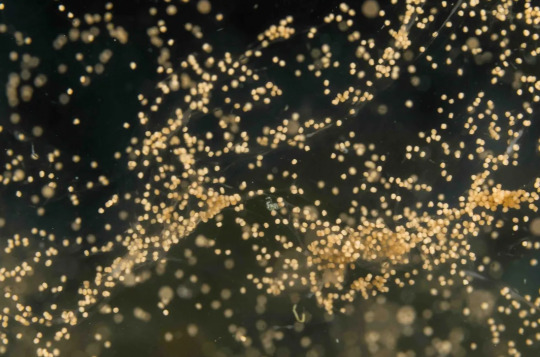
“Each August, corals in Florida release their eggs and sperm into the water[, … but “they] can’t reproduce on their own anymore.” [So, researchers are] collecting and freezing the spawn and growing them into genetically diverse baby corals that can be replanted into the wild[….] These resilient corals could pass important adaptations to their babies[….]”
5. New Legislation Will Accelerate Offshore Wind Energy in Delaware

““The responsible development of offshore wind and the transition to renewable energy is essential for the protection of wildlife, habitats, and communities from the havoc of climate change[….]” “This legislation is the product of careful consideration and input from multiple state agencies, industry experts, energy researchers and environmental advocates[….]””
6. Removal of Apache Trout from Endangered Species List Due to Collaborative Conservation Efforts

“[A]fter more than five decades of recovery efforts by federal, state and Tribal partners, […] the restoration of Arizona’s state fish marks the first […] trout delisted due to recovery, a significant conservation success[….] The Apache trout is found exclusively in streams of the White Mountains in the eastern part of Arizona […] and is sacred to the White Mountain Apache Tribe.”
7. [Texas] State court rules Austin must release files on police complaint

“Under the act, records of any complaint – even if no disciplinary action was taken – must be handed over to the civilian-led Office of Police Oversight. [… T]he ruling ushers in a new level of oversight of the complaint process and the department writ-large.”
8. Super-rare hairy-nosed wombat caught waddling through a woodland in Australia

“Ecologists at Australian Wildlife Conservancy (AWC) say the video footage provides exciting evidence wombats are breeding in the refuge again. […] There are only 400 of them in the world, making them rarer than the giant panda and the Sumatran tiger. […] “Although this isn’t the first joey born at the refuge, it is the first juvenile spotted for a few years.””
9. The country’s biggest electric school-bus fleet will also feed the grid
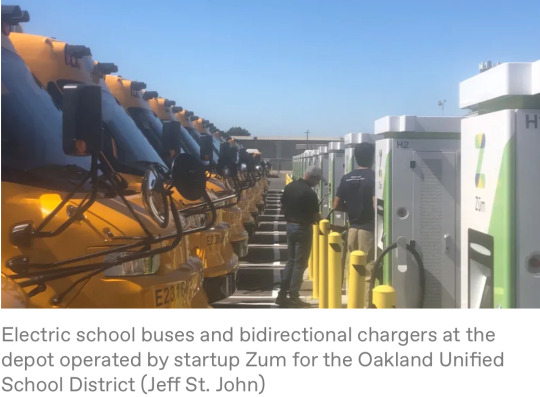
“[The] country’s first all-electric school-bus fleet[,…] which serve the district’s special-needs students, […] can charge with low-cost power and discharge spare capacity at times of grid stress[…. V]ehicle-to-grid charging is something for which electric school buses are particularly well suited.”
10. The Push to Save Horseshoe Crabs Is Gaining Momentum
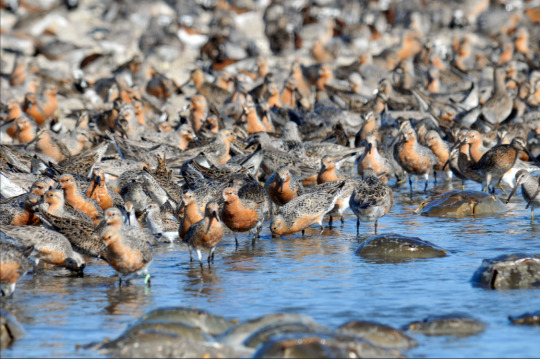
“Conservationists hope new restrictions on harvesting and synthetic alternatives to a crab-blood compound used in biomedical testing can turn the tide for the ancient arthropods, whose eggs are a vital food source for Red Knots [threatened migratory birds]. […] Now conservationists are in the thick of a multi-pronged push to save both species.”
August 22-28 news here | (all credit for images and written material can be found at the source linked; I don’t claim credit for anything but curating.)
#hopepunk#good news#dog#foster dog#animal shelters#dogs#air conditioning#energy efficiency#native#arizona#voting#politics#coral#conservation#wind energy#wind farm#delaware#trout#fish#apache#police#police accountability#wombat#australia#school buses#electric vehicles#horseshoe crab#birds#migration#endangered species
21 notes
·
View notes